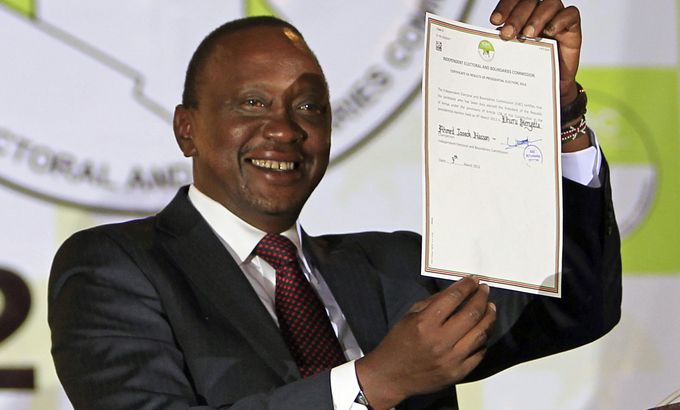
Uhuru Kenyatta: In an ‘awkward situation’?
We ask how Kenya’s new president will govern while facing trial for crimes against humanity in The Hague.
Uhuru Kenyatta has been declared the winner of Kenya’s presidential election but he will enter office with a heavy burden.
|
“The win is really an expression of the will of the Kenyan people and it can be awkward for Western countries particularly for the EU, the UK and the US which had come out prior to the vote and essentially warned the Kenyan people of voting for Uhuru Kenyata … so not awkward for the people but for western powers that tried to influence the elections.“ – Jendayi Frazer,, former US envoy for Africa |
His election victory has left many Kenyans and the international community asking how the new president will govern the country while facing trial at the
International Criminal Court (ICC) for crimes against humanity.
Kenyatta who is Kenya’s richest man, is accused of helping to plot murder, rape and forced displacement during the violence that followed elections in 2007. More than a thousand people were killed in that post election violence.
Although the issue was largely overlooked in Kenya during the latest presidential polls, however, world leaders must now decide what impact Kenyatta’s election victory will have in the region, and on the international stage.
Kenyatta is the second African president facing an ICC trial. Sudanese President Omar al-Bashir was indicted in 2009, for crimes against humanity, and later with genocide. He cannot travel in most parts of the world for risk of being extradited to the Hague but that has not halted his travels.
Within weeks of his indictment, al-Bashir was off to Eritrea, he followed that with a visit to Egypt to meet then-president Hosni Mubarak. He then attended an Arab League summit in Qatar before travelling to Saudi Arabia, where he met senior officials at the Grand Mosque.
In 2010, the Sudanese leader visited Chad, Kenya and Ethiopia. And in the following year, al-Bashir went to Djibouti and Malawi, a signatory of the treaty that established the ICC. He also made a trip to Libya after the fall of Muammar Gaddafi.
|
“Kenya is a very different situation than the other African situations; the fact that we are at the ICC is purely an outcome of Kenyan political decisions. This was a direct outcome of decisions that were made in our own parliament by our own politicians … of course I understand the broader politics of the ICC and Africa, but in the Kenyan situation we are there because we chose to be there.” – Muthoni Wanyeki, expert on Human rights in Kenya |
Last year al-Bashir was in Iraq for the Arab League summit, and he also made an appearance in Iran.
In Kenya, however, Kenyatta’s opponents say the ICC trial in The Hague will lead to country’s political and economic isolation.
Some European Union countries have already said they will only have ‘essential contact’ with Kenyatta. It is a worry for some Kenyans as the economy depends on good ties with Western nations.
The East African nation exports agricultural products such as tea, coffee and flowers to Europe and the United States. Tourism is also a key source of income.
But the West depends on Kenya too – the country is an important ally in the United States’ war against Islamic extremism in the region.
Kenyan troops are currently fighting al-Shabaab in Somalia, with assistance from the US.
But with more than half of voters choosing to back Kenyatta, it appears some at least do not appear to be concerned that he is wanted by the ICC.
Discussing this with Jane Dutton on Inside Story are guests: Muthoni Wanyeki, former executive director of the Kenyan Human Rights Commission; Jendayi Frazer, former US assistant secretary of state for African Affairs; and Paul Moorcraft, director of the Centre for Foreign Policy Analysis.
|
“It is very embarrassing because the the original indictment was to try and get some stability after the previous bloody elections and now the indictment if it continues, it could undermine this very peaceful election, so the whole purpose of the international intervention is being undermined; one of the problems with the ICC is law of unintended consequences.” Paul Moorcraft, director of the Centre for Foreign Policy Analysis |